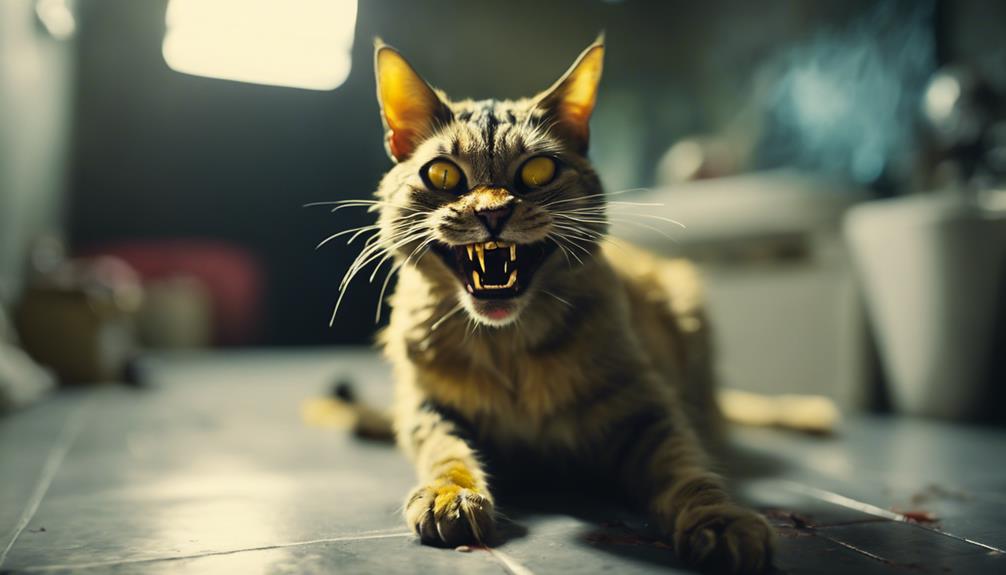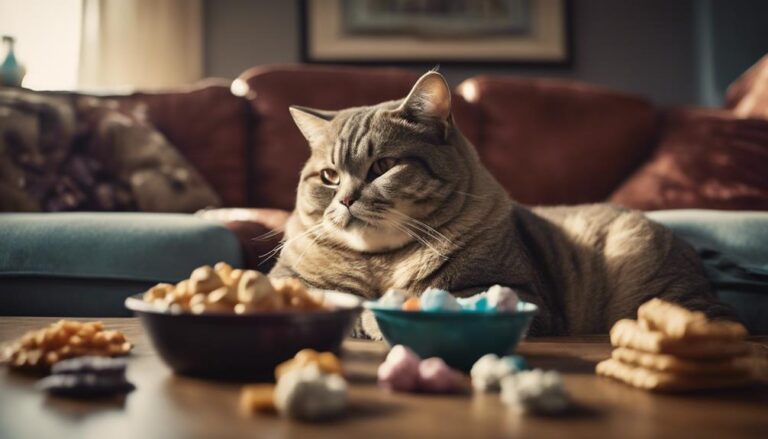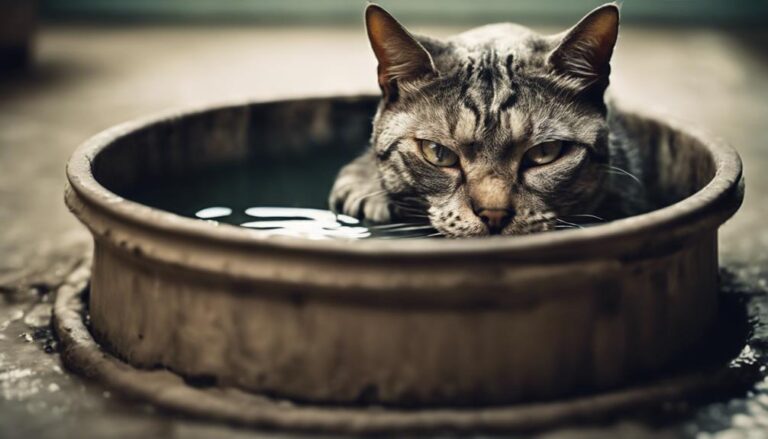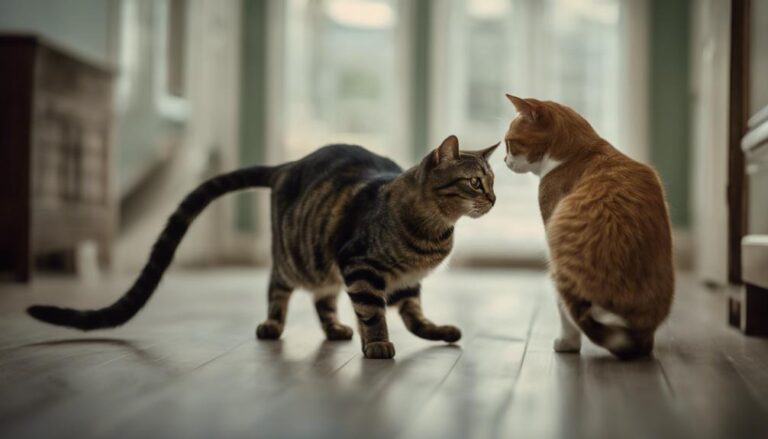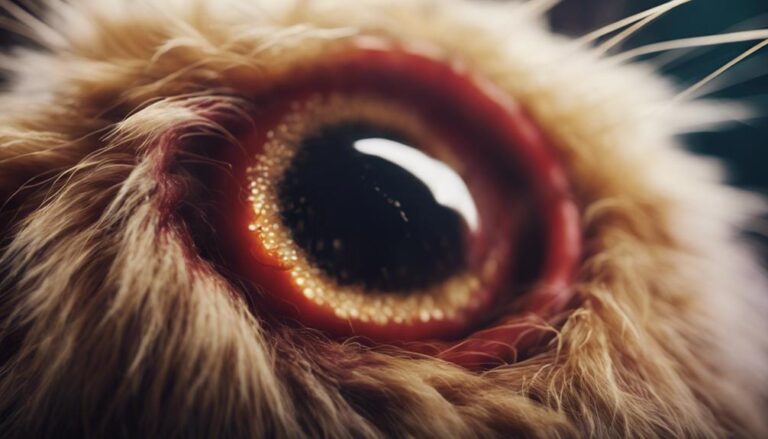Ignoring your cat's dental health may seem harmless, but the repercussions can be severe. From painful infections to tooth loss, the effects of neglecting their teeth can be far-reaching. But what if there's more to it than just dental problems? Stay tuned to unravel the hidden dangers that poor cat dental health can pose to your feline companion's overall well-being.
Consequences of Neglected Cat Dental Care
Neglecting your cat's dental care can have severe consequences for their overall health, potentially leading to infections in vital organs. When it comes to cat dental care, it's crucial to understand the risks associated with neglected dental health. Dental disease in cats isn't just about bad breath or yellow teeth; it can progress to advanced gum disease, where the gums become inflamed and painful. Over time, this inflammation can lead to tooth resorption, a condition where the body reabsorbs the tooth, causing extreme discomfort for your cat.
If left untreated, the bacteria from the mouth can spread through the bloodstream, reaching vital organs like the heart, liver, and kidneys. This can result in serious infections that pose a significant threat to your cat's well-being. By ignoring your cat's dental care, you aren't only risking their oral health but also putting their overall health in jeopardy. It's essential to prioritize regular dental check-ups and proper oral hygiene to prevent these potentially life-threatening consequences.
Pain and Inflammation in Cats
When your cat's teeth decay, it causes discomfort; gum disease induces pain, and infections lead to swelling. These issues can make eating difficult for your feline friend, lowering their quality of life.
Regular dental care can help prevent these painful problems.
Tooth Decay Causes Discomfort
Tooth decay in cats can cause discomfort, leading to pain and inflammation in their mouths, affecting their overall health if left untreated. Cats with tooth decay may experience symptoms like decreased appetite or pawing at their mouths due to the discomfort.
Untreated tooth decay can escalate into oral infections, further jeopardizing a cat's well-being. The pain and inflammation resulting from dental issues can significantly impact a cat's quality of life, emphasizing the importance of prompt intervention.
Regular dental care plays a crucial role in preventing tooth decay and the associated discomfort in cats. Therefore, staying vigilant about your cat's oral health and addressing any signs of discomfort promptly can help maintain their overall well-being.
Gum Disease Induces Pain
Ignoring signs of discomfort in your cat's oral health may lead to serious consequences. Gum disease can induce pain and inflammation, affecting their overall well-being. Pain and discomfort caused by gum disease can result in changes in your cat's eating habits. They may be reluctant to chew due to the sensitivity in their gums.
The inflammation associated with gum disease can manifest as redness, swelling, and even bleeding in the gums. It's essential to prioritize your cat's dental care and regularly monitor their oral health to prevent these issues. By staying proactive and addressing gum disease promptly, you can help alleviate their pain and ensure their dental health is maintained.
Infections Lead to Swelling
Regularly monitoring your cat's dental health is crucial to prevent infections that can lead to swelling, causing pain and inflammation in their oral cavity. Here's why you should address these issues promptly:
- Discomfort: Swelling from oral infections can make it painful for your cat to eat and groom properly.
- Quality of Life: Pain and inflammation due to dental infections can significantly impact your cat's overall well-being and happiness.
- Complications: Swollen gums and tissues in cats with dental infections can signal advanced stages of dental disease, which may lead to further complications if left untreated.
Take action to alleviate their discomfort, improve their quality of life, and prevent potential complications by addressing infections that cause swelling in your cat's oral cavity as soon as possible.
Impact on Eating and Nutrition
If your cat has dental problems, it might struggle to eat properly and may avoid crunchy foods. This can lead to nutritional deficiencies and weight loss if left untreated.
Ensuring your cat's dental health is crucial for its overall well-being and eating habits.
Eating Difficulties
Cats with poor dental health often struggle with eating due to pain while chewing. This can lead to various eating difficulties and impact their overall nutrition. Here are three ways dental problems can affect a cat's eating habits:
- Decreased Appetite: Dental pain can cause a cat to have a decreased appetite, resulting in weight loss over time.
- Preference for Soft Food Options: Cats with dental issues may avoid hard kibble and instead prefer softer or moist food options that are easier to consume.
- Finicky Eating Behaviors: Due to discomfort while eating, cats may develop finicky eating behaviors and show reluctance to consume certain foods.
It's essential to address dental problems promptly to ensure your cat's eating habits and nutritional needs are met.
Nutritional Deficiencies
Addressing your cat's dental health can significantly impact their nutritional intake, especially considering the potential for nutritional deficiencies stemming from poor oral health. Cats with dental issues may struggle to eat hard kibble, leading to a lack of essential nutrients in their diet. This deficiency can result in weight loss and a decline in overall health and well-being.
Furthermore, dental pain can cause cats to eat less, exacerbating their nutritional deficiencies. Ensuring that your cat receives adequate nutrition is crucial for maintaining their overall health, especially when dealing with poor dental health.
Risk of Tooth Loss in Cats
Untreated dental diseases like gingivitis and periodontitis can lead to tooth loss in cats. This can have a significant impact on their overall health and wellbeing. Here are three key points to consider:
- Tooth Resorption: More than 70% of cats over five years old show signs of tooth resorption, a condition where the tooth structure is broken down and absorbed by the body. If left untreated, tooth resorption can result in tooth loss and discomfort for the cat.
- Need for Tooth Extractions: Cats with advanced dental disease may require tooth extractions to address severe issues and prevent further complications. Tooth extractions are necessary to alleviate pain and ensure the cat's oral health.
- Importance of Regular Dental Care: Regular dental care and early intervention are essential in preventing tooth loss in cats. By staying proactive with your cat's dental health, you can help maintain their teeth, prevent diseases, and ultimately reduce the risk of tooth loss.
Importance of Early Detection
Early detection of dental issues in cats is crucial for maintaining their oral health and overall well-being. By scheduling regular check-ups with your veterinarian, you can catch any dental problems early on. This proactive approach allows for prompt treatment, preventing your cat from experiencing pain and discomfort.
Not only does early detection save your furry friend from suffering, but it also helps in avoiding high veterinary costs associated with advanced dental problems. Detecting dental issues in their initial stages can significantly enhance your cat's overall health and quality of life.
Role of Dental Cleanings
Regular dental cleanings play a crucial role in maintaining your cat's oral health and preventing potential dental issues. Here's why they're essential:
- Preventing Gum Disease: Dental cleanings help remove plaque and tartar buildup that can cause gingivitis and progress to more severe periodontal disease, which can be painful and lead to tooth loss if left untreated.
- Professional Examination: Professional dental cleanings conducted under anesthesia allow for a thorough examination of each tooth and the surrounding tissues. This enables the veterinarian to identify any issues early on and address them before they escalate.
- Preventive Measures: Regular dental cleanings can help prevent complications such as tooth decay, tooth loss, and systemic infections in your cat. Veterinarians often recommend annual dental cleanings to maintain good oral health and overall well-being for your feline companion. Remember, scaling and polishing during these cleanings are crucial for your cat's dental health.
Frequently Asked Questions
How Serious Is Dental Disease in Cats?
Dental disease in cats is serious. Without proper care, it can lead to infections affecting vital organs. By age three, almost every older cat has dental issues. Untreated gum disease can progress to tooth resorption, causing pain and complications.
What Can Poor Dental Care Lead To?
Neglecting your cat's dental care can lead to serious health issues. Infections can spread to vital organs like the heart, liver, kidneys, or lungs. It's crucial to prioritize regular dental care to avoid these risks.
Is My Cat Too Old for Dental Surgery?
If your cat is considered too old for dental surgery, consult your vet for individual health assessment. Age alone doesn't dictate eligibility. Proper evaluation can ensure senior cats undergo safe dental procedures.
What Is Stage 4 Periodontal Disease in Cats?
Stage 4 periodontal disease in cats involves severe inflammation, infection, and bone loss around teeth. If untreated, it can lead to tooth loss and pain. Veterinary care is crucial, including cleanings, extractions, and antibiotics.

